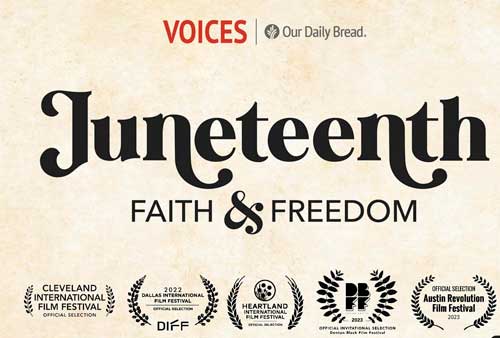
Last week’s sermon’s (Jun 11) key phrase was “Press on to know the Lord.” The knowledge and love of God bring peace and a deeper knowledge and love of God and is a circular turning that promotes more of the same and our own spiritual growth.
Today’s sermon (June 18) “As we receive God’s peace, as we come to know God’s love more and more personally, we also find that our hearts fill with joy. And that is the theme of today’s sermon! Rejoice! To rejoice in God is our reason for being! “
That is our point of rejoicing for religious reasons. But there is also political freedom that intersects the religious. Today, June 19 is Juneteenth the second of three documents during the Civil War promoting freedom for black slaves – Emancipation Proclamation, Juneteenth, and the 13th Amendment. This one extended the Emancipation Proclamation to Texas. This one also must have caused rejoicing since an army came with it to enforce it. And this rejoicing is for all. The first institution that the emancipated people of Galveston established legally was a church . As Time magazine recently wrote “We should care because the very fabric of our society depends on our shared religion of inalienable rights. A celebration of freedom for any American is a celebration of the ideals that make our country what it is today.”
In honor of Juneteenth, two of our hymns on Sunday, June 18 were “We Shall Overcome” and “Go Down Moses” The bulletin contained a background of both hymns. We Shall Overcome” began as a folk song, a work song. Slaves in the fields would sing, ‘I’ll be all right someday.’ It became known in the churches. A Methodist minister, Charles Albert Tindley, published a version in 1901: “I’ll Overcome Someday.” As it spread it became a political message and one looking for eventual progress. With “Go Down Moses” slaves related their experiences under slavery to Moses and Israelites who were enslaved by the Pharaoh. It was used by Harried Tubman to communicate with fugitive enslaved people.
Juneteenth was kept alive by black populations despite the pushback. They were the fruits of their rejoicing. As historian Henry Louis Gates recounts about Juneteenth “For them, Juneteenth was, from its earliest incarnations… a past that was “usable” as an occasion for gathering lost family members, measuring progress against freedom and inculcating rising generations with the values of self-improvement and racial uplift.”
Links for Juneteenth
1. Here is Henry Louis Gates on Juneteenth
